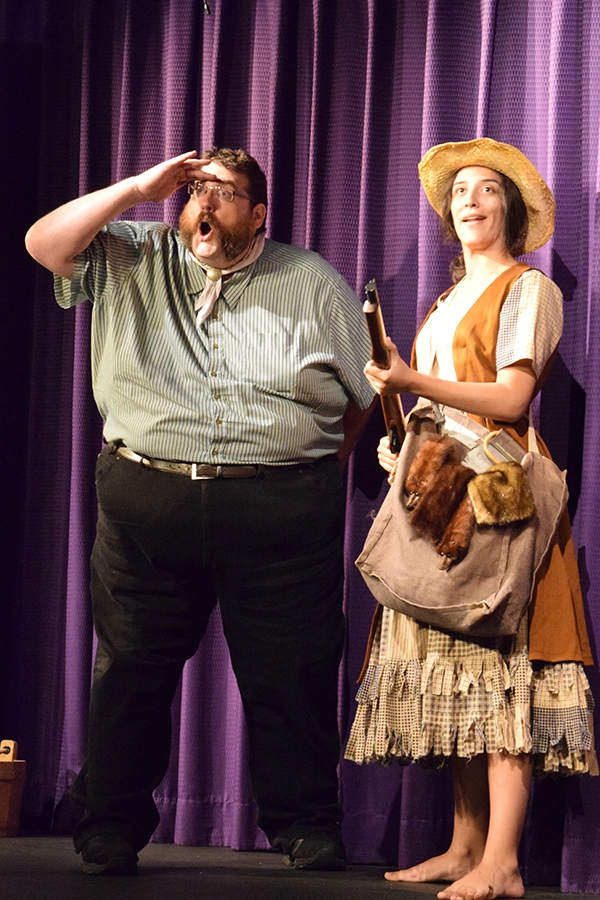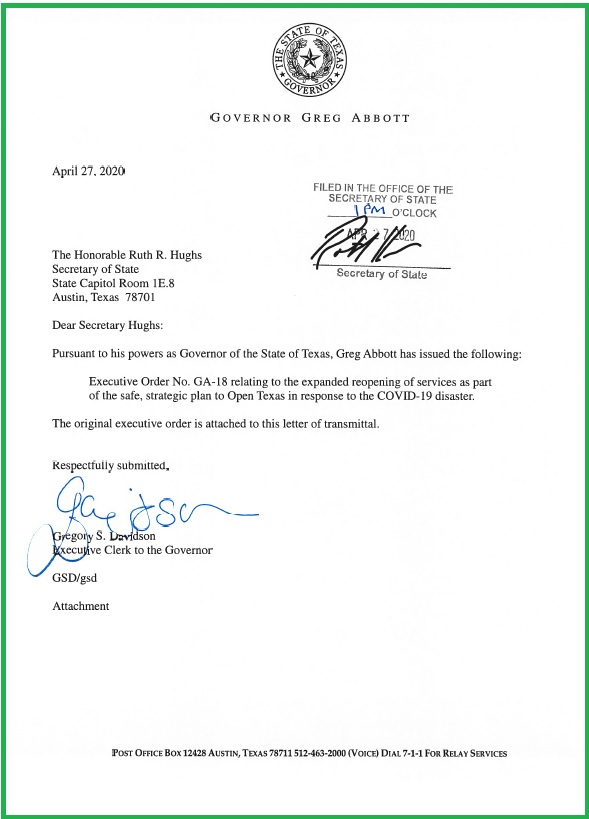Real Annie Oakley empowered women

Alexandria Randolph/Highland Lakes Newspapers
Hotel owner Foster Wilson (Managing Editor Lew K. Cohn) is stunned at the shooting prowess of Annie Oakley (Christine Ashbaugh) during a Hill Country Community Theatre performance of Irving Berlin’s “Annie Get Your Gun.” The real Annie Oakley was an empowering figure for American women who, during her heyday, earned more than anyone else in Buffalo Bill’s Wild West except Buffalo Bill Cody himself.
by Lew K. Cohn
Managing Editor
Highland Lakes Newspapers
For the past few months, my fellow cast and crew at the Hill Country Community Theatre have been recreating the fictionalized story of sharpshooters Annie Oakley and Frank Butler on stage in the Irving Berlin muscial “Annie Get Your Gun.”
The production features some of the most recognizable music in the history of American theater, including the anthemic “There's No Business Like Show Business” and the rousing “Anything You Can Do.”
As of today, July 29, we have three more productions of this show — at 7:30 p.m. tonight and tomorrow, July 30, and at 2:15 p.m. Sunday, July 31 — before we say goodbye to Col. Buffalo Bill Cody's Wild West Show and strike the set.
The musical, with book written by Dorothy and Herbert Fields, was first performed 70 years ago on Broadway and starred the great Ethel Merman as Annie Oakley and Ray Middleton as Frank Butler. It debuted nearly 20 years after the deaths of Oakley and Butler and did a lot to influence America's perception of the duo and their romance. But what was the true story of the woman Chief Sitting Bull called “Little Sure Shot” and her beau?
Annie Oakley was born Phoebe Ann Mosey on Aug. 13, 1860, in Darke County, Ohio. When she was young, her father, and later stepfather, both died, so she learned how to trap and hunt by age eight to support her family, selling the game she caught or shot to local hotels and shopkeepers. Annie was sent to live in the Darke County Infirmary, where she learned to sew and decorate from the superintendent's wife.
In 1870, she was sent to work for a family in a neighboring county and spent two years in near-slavery conditions before running away back to the infirmary in 1872. By 1875, she was back home with her mother and her third husband and siblings and her abilities as a marksman helped her pay off her mother's mortgage on her farm.
On Thanksgiving Day, 1875, the Baughman & Butler shooting act came to Cincinnati. Irish immigrant and traveling show marksman Frank E. Butler, 13 years Annie's elder, placed a $100 side bet with Cincinnati hotel owner Jack Frost that he could beat any local fancy shooter. Frost chose Annie to represent his interests and the match commenced. Legend has it that on his 25th and final shot, Butler missed a target and Annie was named the winner.
It is interesting to note that The Cincinnati Enquirer and several Oakley biographers dispute the date of the match and instead insist that it likely occurred in 1881, which is when Baughman & Butler signed on with the Sells Brothers Circus and made an appearance at the Coliseum Opera House.
Butler would later court Annie and the couple were wed a short time later, either in 1876 or 1882. There is a certificate of marriage on file in Windsor, Ontario, showing Butler and Oakley were wed on June 20, 1882, but some biographers claim the couple were married on Aug. 23, 1876. It was her first and only marriage and his second. They would remain married until her death and had no children.
Annie took the stage name Oakley, perhaps after the Cincinnati neighborhood of the same name, and she and Butler began performing together in 1882. Upon meeting Sioux Chief Sitting Bull in 1884, she impressed the elder statesman so much that he “adopted” her as a daughter and gave her the name “Watanya Cicilla” or “Little Sure Shot” due to her prowess with firearms and her diminutive stature, standing just five feet tall.
Butler and Oakley joined Buffalo Bill's Wild West in 1885 for a short stint before returning for a three-year tour of Europe beginning at the Paris Exhibition of 1889. Oakley earned more money than anyone else on the tour except Cody himself. While in Europe, she performed for royalty, including Queen Victoria, King Umberto I of Italy and Kaiser Wilhelm II of Germany. She famously shot a cigarette from the mouth of the newly-crowned kaiser at his request.
A 1901 train wreck temporarily paralyzed Oakley, who was told she may never walk again. She recovered after five spinal operations and went on to perform again, including on stage in a melodrama, “The Western Girl.” She became a champion for women's rights and a steadfast and tireless supporter of the Red Cross and the nation's efforts in World War I.
At the age of 66, Annie Oakley died from pernicious anemia in Greenville, Ohio, on Nov. 3, 1926. A grief-stricken Butler refused to eat and died 18 days later on Nov. 21, 1926. Her ashes were buried with him on Thanksgiving Day, 1926.
Her name is now used a slang for the hole punched in a ticket to gain admission into a show or event and her legacy lives on in “Annie Get Your Gun.” She was an American icon who helped empower women and prove that anything a man could do, she could and often did better.






